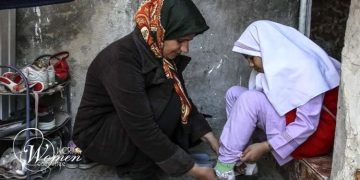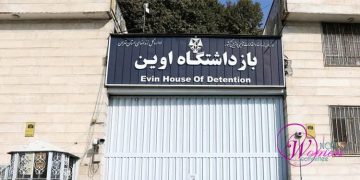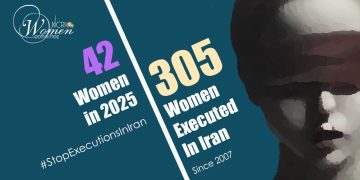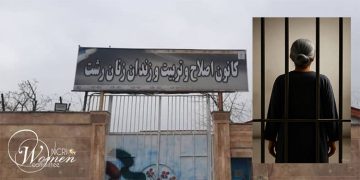From the memoir by Hengameh Haj Hassan – Part 22
In this part of her memoir, Face to Face with the Beast, Hengameh Haj Hassan, a nurse at Sina Hospital in Tehran in 1981, continues to recount what she witnessed, the devastating effects of the regime’s inhuman torture methods in the so-called “Residential Unit” in Ghezelhesar Prison and the prisoners’ resilience despite the regime’s psychological warfare:
When I returned to Shekar, it was dinnertime. She said, “Hengameh, they told us we can’t share meals anymore. No one’s allowed to eat dinner with anyone else! They said we can only say befarma!”[1] I said, “Who came up with this nonsense? Haji?” Then I added, “Well, if that’s the rule, we’ll make sure to follow it to perfection!”
I told her, “Now you can say befarma to me,” and she jokingly replied, “Befarma!”
I thanked her, and the two of us started eating the abdoogh khiar[2] they had given us, laughing at Haji and all the torturers and tavvabs.[3] That night, the abdoogh khiar tasted heavenly.
She said, “Hengameh, you’ve become like Indira Gandhi.”
I laughed. “The others say that too. At least something about us resembles famous people!”
We both burst out laughing.
Then she said, “Don’t tie your hair back like that, let it loose.”
I said, “Forget it, this way is better.”
She said, “No — they’ll say you’re political.”
I shrugged. “Let them say it. We are political.”
She said worriedly, “No, then they’ll start their tricks again. They’ll take you away and torture you.”
I could tell these anxieties came from the same twisted pretexts and humiliations they had endured in the Residential Unit — the same mind games that had driven so many to the brink of madness.
I said, “Shekar, forget the Residential Unit. You’re here now. That’s over — don’t think about it anymore.”
I wanted to help her regain her mental balance, because every reminder of that place threw her off completely. Every word, every action I took had to be preceded by an effort to undo what had been implanted in her mind there.
It wasn’t too hard, because Shekar listened to me easily. But I still needed to understand what this cursed thing, this Residential Unit, really was. It was a horrifying and baffling riddle.
From what I’d gathered from Shekar and the others, I realized that in that place, everything could lead to torture, doing something, not doing something, even the smallest act.
If they spoke, they were beaten for speaking.
If they stayed silent, they were beaten for staying silent.
It made no difference, everything became an excuse for torture, carried out right there in front of everyone.
Because of this, the prisoners in the Residential Unit avoided even looking at one another. They stopped greeting, stopped doing the most ordinary things. They sat for hours and days, facing the wall in silence, unmoving, speaking to no one.
Shekar ate very little. Even when she did, she immediately turned her face away and vomited what she had eaten into a small, lidded container. She had ulcers and had suffered stomach bleeding several times, but most of the vomiting was psychological.
She said, “I don’t want to eat anymore. Whatever I eat, I throw up.”
I told her, “That’s okay, eat anyway. If you throw up, it’s fine. It’s still better than not eating.”
She agreed, and strangely, within a few days, the vomiting became much less frequent.
A Slap for the Sellout Doctor
Massoumeh Joshaghani was also in our ward. She had been a senior nurse in the infectious disease unit of the Thousand-Bed Hospital. Before Shekar was dismissed from there, she had worked with Massoumeh, and I had met her once when I went to that hospital to see Shekar.
Massoumeh’s husband was a university professor and an active member of the resistance. After June 1981, when the regime failed to capture her husband, they arrested her instead. Despite the brutal interrogations and torture, they couldn’t get to him, so they sentenced her to three years in prison.
Although Massoumeh herself hadn’t directly worked with the Mojahedin, she was always supportive of the imprisoned women, which made Haji Davood[4] despise her. The women, on the other hand, loved her deeply.
When she was transferred to Ward 7, we immediately bonded, our shared ground being the Mojahedin, Shekar, and our profession. Massoumeh, like the rest of us, loathed the tavvabs and traitors. She had seen through them completely and had drawn a firm line between herself and the collaborators.
Because of her medical background, she was assigned to work in the infirmary. She accepted the post after consulting with the others.
There, a doctor named Hosseini — once a leftist affiliated with Peykar,[5] now a tavvab who had joined hands with Haji Davood — also worked. He had long abandoned the ethics of his profession. Of course, under the roof of betrayal, talk of “professional honor” or “conscience” may sound naïve, but still — there were doctors in that same prison who, despite their differences with the Mojahedin, maintained their integrity. They never broke the sanctity of their profession and treated injured or ill prisoners with compassion and a sense of responsibility — sometimes paying dearly for it when they clashed with the torturers.
But this Dr. Hosseini refused to treat the patients from Ward 8, the resistant and “punished” ones, intentionally causing them more pain, even when their condition was critical.
One day, Massoumeh Joshaghani lost her temper over his indifference and confronted him.
Hosseini, trying to impress Haji Davood who was standing nearby, sneered,
“What’s wrong with you? Are the girls from Ward 8 your cousins or something, that you care so much?”
Massoumeh, right there in front of Haji Davood, slapped him hard across the face and shouted, “No, you heartless man! The traitors are your cousins!”
She really put him in his place.
After that incident, as punishment, Massoumeh was transferred to Ward 8, and that’s how the three of us ended up together again.
Massoumeh was overjoyed to see how much Shekar had improved.
[1] Befarma – a polite Farsi expression meaning “please,” often used to invite someone to eat, sit, or begin something.
[2] Abdoogh khiar – a cold Persian dish made with yogurt, cucumber, herbs, and bread pieces, similar to a refreshing cold soup.
[3] Tavvab – literally “repentant”; in prison context, it refers to prisoners who collaborated with interrogators after “repenting.”
[4] Haji Davood – a feared prison official known for extreme cruelty; “Haji” is a religious honorific often used for such figures.
[5] Peykari – a reference to a Marxist-Leninist group active before and after the 1979 Revolution.
























